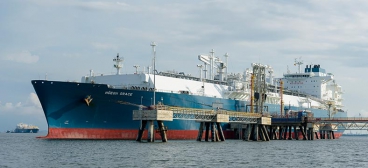Hoegh Upbeat on Need for FSRUs
Norway-based shipowner Hoegh LNG said February 28 it made a net 4Q 2016 profit of $828,000, reversing a net $33mn loss in the same 2015 quarter. It made a profit in each of the four quarters in 2016. Operating earnings (Ebitda) in 4Q2016 were $31.2mn, up from $24.6mn a year before.
The company has six floating LNG import terminals (FSRUs) now in operation for a total regas capacity of 3.4bn ft³/d, plus two LNG carriers; it has a further four FSRUs under construction, for a regas capacity of 3.25bn ft³/d.
During 4Q2016 it signed 20-year FSRU charter agreements with Quantum Power for Ghana, and Global Energy Infrastructure (Geil) for Pakistan, and its FSRU Hoegh Grace began commercial operation under long-term contract in Colombia. It signed a shipbuilding contract with South Korean shipbuilder Samsung Heavy Industries for an FSRU for delivery in 2Q 2019 and three optional FSRUs.
Hoegh LNG on December 11 also started its first FSRU in the Turkish market on behalf of French customer Engie. It owns 50% equity in the FSRU.

Hoegh Grace is employed in Colombia (Photo credit: Hoegh LNG)
So far this year, it signed a further shipbuilding contract in South Korea, this time with Hyundai Heavy Industries for an FSRU for delivery in 4Q 2018, and signed a heads of agreement with Qatar Petroleum, Total, ExxonMobil, and Mitsubishi for FSRU terminal infrastructure for the Geil project.
Its outlook for the global LNG sales is bullish, following total world export volumes up 6% to a new all-time high of 260mn metric tons in 2016, thanks to new liquefaction capacity starting in the US and Australia. It noted that around 100mn mt/yr of extra liquefaction capacity is due onstream by 2020 and that “the LNG market should continue to see ample additional supplies in the years to come.”
Imports through FSRUs worldwide rose by around 40% to about 31mn mt in 2016 as new units started operation, it added. FSRU operators include Hoegh LNG, Excelerate, Golar LNG and Exmar.
Mark Smedley




